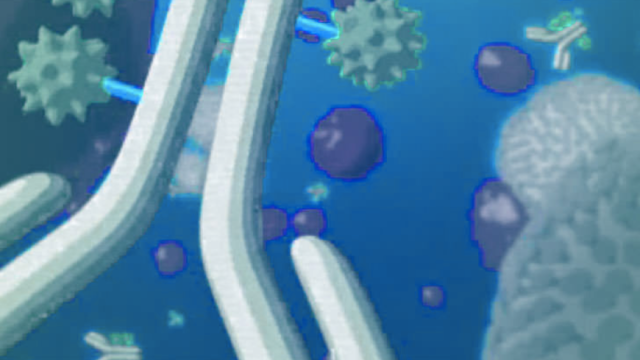As 2016 draws to a close, two of what started out as this year’s most promising new cancer therapies have ground to a halt amidst patient deaths during the experimental treatments.
An antibody-drug conjugate by Roche, the same class of drug as the Seattle Genetics trial suspended. Image: Roche
On Tuesday, the biotech firm Seattle Genetics announced that four leukaemia patients participating in clinical trials of its drug, vadastuximab talirine, died as the result of liver damage while taking the drug.
While it is not yet clear whether the drug was the culprit of either the liver damage or the deaths, the FDA placed a hold on one phase I trial of the drug to further evaluate its potential risks, and forced Seattle Genetics to halt enrolment of new patients in two other studies. It’s the second in a wave of cutting-edge new leukaemia therapies to face obstacles after patient deaths.
Vadastuximab had so far been tested in more than 300 patients as a potential treatment for an aggressive blood and bone marrow cancer called acute myeloid leukaemia. The drug works by targeting leukaemia cells specifically, leaving healthy cells unscathed. Early studies showed promising rates of remission, though as The Wall Street Journal notes, this type of targeted drug has had troubles before.
In July, the FDA similarly placed a hold on clinical trials of another leukaemia treatment from the company Juno Therapeutics after two patient deaths. Those trials were eventually permitted to resume, but suspended again by the company last month after two more patient deaths. Deaths following the Juno trials, which relied on a new immunotherapy approach called CAR-T, have thrown the company into controversy. Some accused Juno of hiding the deaths from the public and investors while its CEO sold off stock. Others accused it of “going way too fast” with the trials, with a cavalier disregard for patient well-being.
Patient deaths place future trials in a tough spot, but they do not necessarily mean that the treatments themselves are unsafe. After the first time its trials were halted, for example, Juno said it believed the deaths were due to a reaction between a chemotherapy drug and the CAR-T treatment. (The second two patients to die, however, had not received the chemotherapy drug in question.)
The latest drug ordered on hold by the FDA, Vadastuximab, is what’s known as an antibody-drug conjugate. One component of the drug searches for receptors on cancer cells to target, while another destroys those cells once detected. In 2010, the drug company Pfizer saw an even greater number of deaths with another antibody-drug conjugate, Mylotarg. That drug was also associated with a severe liver condition.
The FDA has allowed Seattle Genetics’ later-stage trials of the drug to continue. In the meantime, the company said it is “working diligently with the FDA” to determine why its patients are dying.
[WSJ]
